
Some snippets from Thinking in Systems (first draft 1993, published posthumously 2008; Donella Meadows).
1/ The central insight of systems theory: Once we see the relationship between structure and behavior, we can begin to understand how systems work, what makes them produce poor results, and how to shift them into better behavior patterns. 
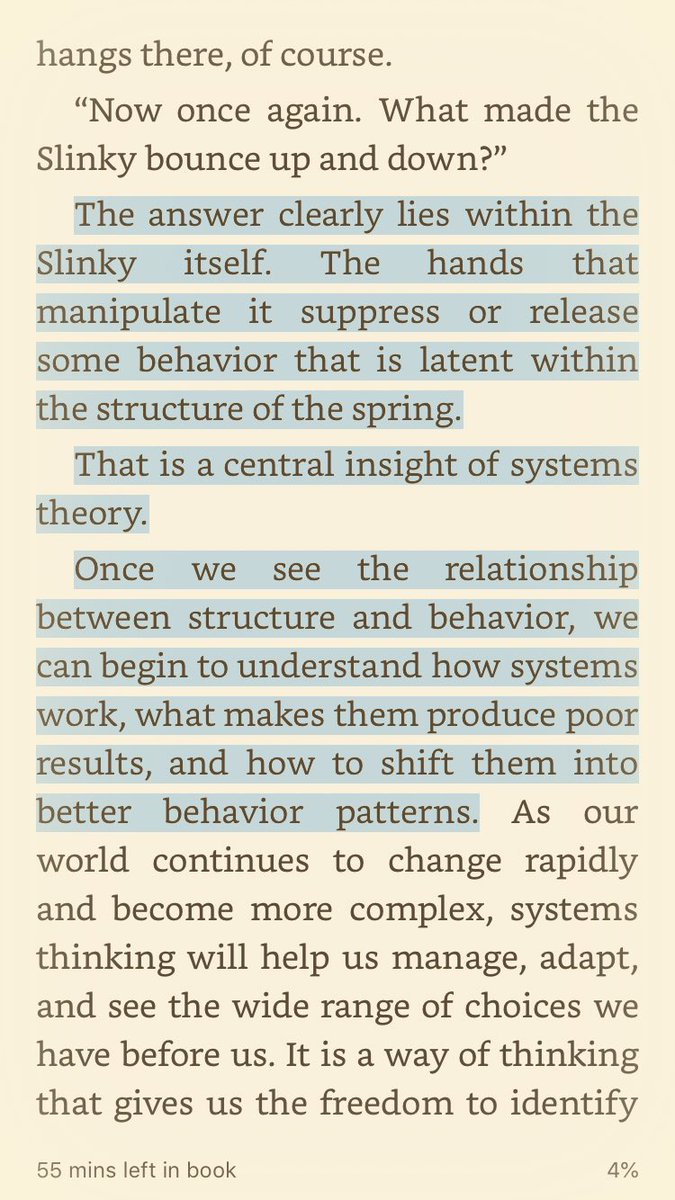
2/ A great aspect is the use of analogies.
Modern systems theory, bound up with computers and equations, hides the fact that it traffics in truths known at some level by everyone. It is often possible, ... to make a direct translation from systems jargon to traditional wisdom.

Modern systems theory, bound up with computers and equations, hides the fact that it traffics in truths known at some level by everyone. It is often possible, ... to make a direct translation from systems jargon to traditional wisdom.


3/ Ever since the Industrial Revolution, Western society has benefited from science, logic, and reductionism over intuition and holism. Psychologically and politically we would much rather assume that the cause of a problem is “out there,” rather than “in here.” 
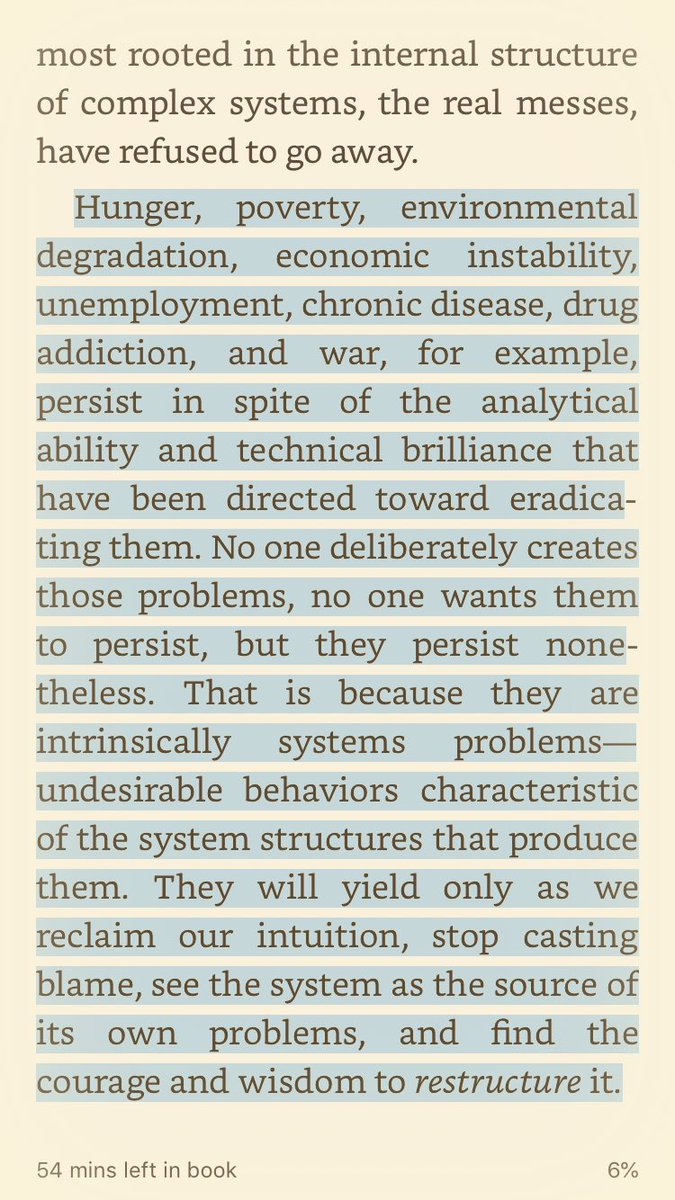
4/ If you look at that definition closely for a minute, you can see that a system must consist of three kinds of things: elements, interconnections, and a function or purpose.
5/ Don't just look at elements, look at relationships.
You think that because you understand “one” that you must therefore understand “two” because one and one make two. But you forget that you must also understand “and.” —Sufi teaching story
You think that because you understand “one” that you must therefore understand “two” because one and one make two. But you forget that you must also understand “and.” —Sufi teaching story

6/ How to find out the purpose of a system:
Purposes are deduced from behavior, not from rhetoric or stated goals.
Same goes for company culture: it is what gets rewarded, promoted and celebrated not just what's stated.
Purposes are deduced from behavior, not from rhetoric or stated goals.
Same goes for company culture: it is what gets rewarded, promoted and celebrated not just what's stated.
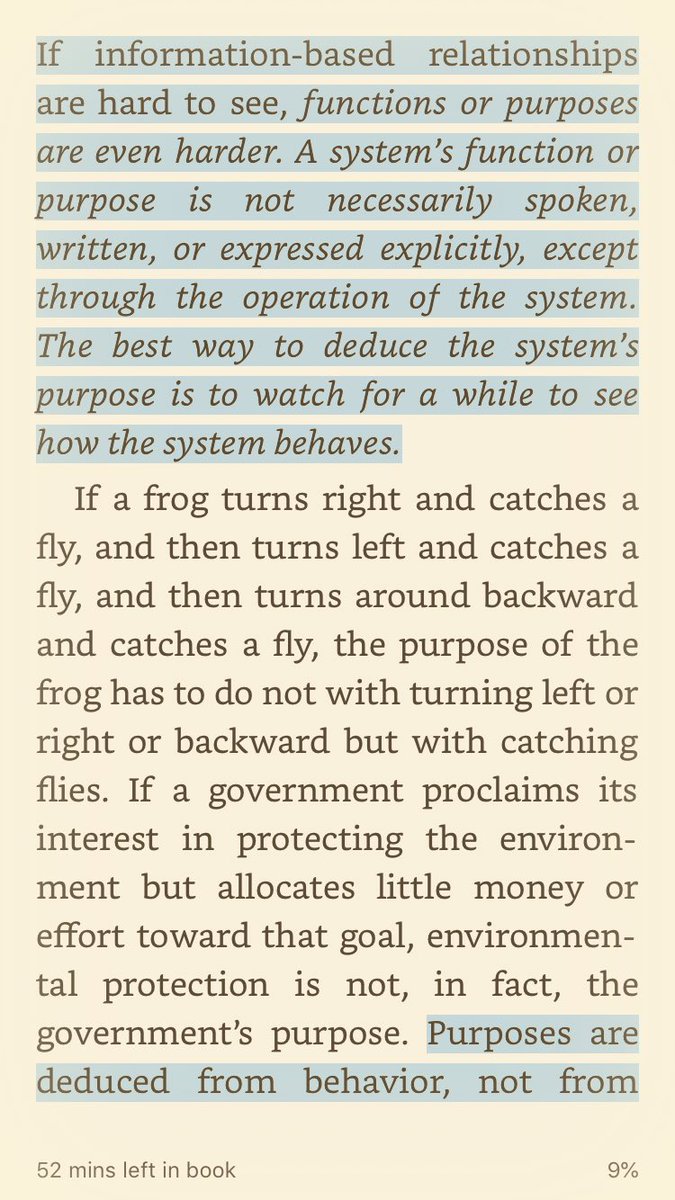
7/ Why systems work well.
You may have observed these characteristics: resilience, self-organization, or hierarchy.
Placing a system in a straitjacket of constancy can cause fragility to evolve.
@nntaleb took it one step further with Antifragility - benefiting from shocks.
You may have observed these characteristics: resilience, self-organization, or hierarchy.
Placing a system in a straitjacket of constancy can cause fragility to evolve.
@nntaleb took it one step further with Antifragility - benefiting from shocks.

8/ Resilience is not the same thing as being static or constant over time. Resilient systems can be very dynamic. Short-term oscillations, or periodic outbreaks, or long cycles of succession, climax, and collapse may be normal which resilience tries to restore.
9/ Because resilience may not be obvious without a whole-system view, people often sacrifice resilience for stability, or for productivity, or for some other more immediately recognizable system property. 

10/ Like resilience, self-organization is often sacrificed for purposes of short-term productivity and stability. Productivity and stability are the usual excuses for turning creative human beings into mechanical adjuncts to production processes. 

11/ In the process of creating new structures and increasing complexity, one thing that a self-organizing system often generates is hierarchy.
Fleas all the way down. Fractal nature of things.
Fleas all the way down. Fractal nature of things.

12/ Why systems surprise us.
The trouble . . . is that we are terrifyingly ignorant. The acquisition of knowledge always involves the revelation of ignorance. Our knowledge of the world instructs us first of all that the world is greater than our knowledge of it.
The trouble . . . is that we are terrifyingly ignorant. The acquisition of knowledge always involves the revelation of ignorance. Our knowledge of the world instructs us first of all that the world is greater than our knowledge of it.

13/ The interactions between what I think I know about dynamic systems and my experience of the real world never fails to be humbling. They keep reminding me of three truths.
14/
1. Everything we think we know about the world is a model.
2. Our models usually have a strong congruence with the world.
3. However, and conversely, our models fall far short of representing the world fully. That is why we make mistakes and why we are regularly surprised.
1. Everything we think we know about the world is a model.
2. Our models usually have a strong congruence with the world.
3. However, and conversely, our models fall far short of representing the world fully. That is why we make mistakes and why we are regularly surprised.
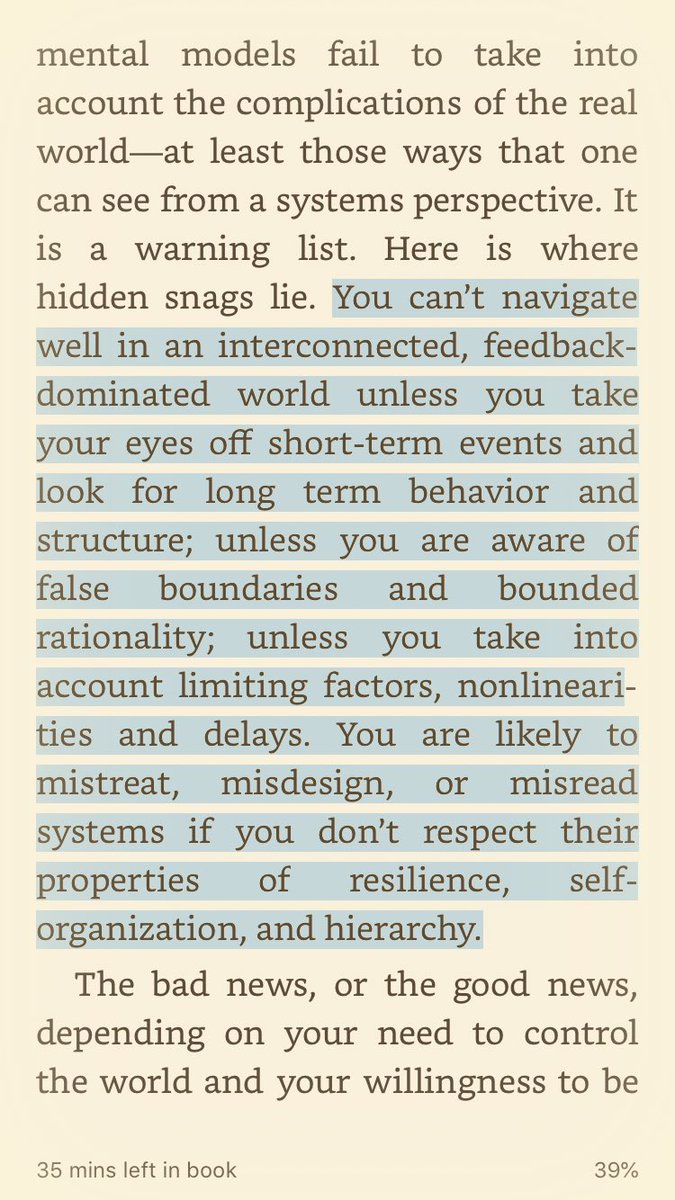
15/ How systems fools us.
Systems fool us by presenting themselves—or we fool ourselves by seeing the world—as a series of events. Events are the outputs, moment by moment, from the black box of the system.
Systems fool us by presenting themselves—or we fool ourselves by seeing the world—as a series of events. Events are the outputs, moment by moment, from the black box of the system.
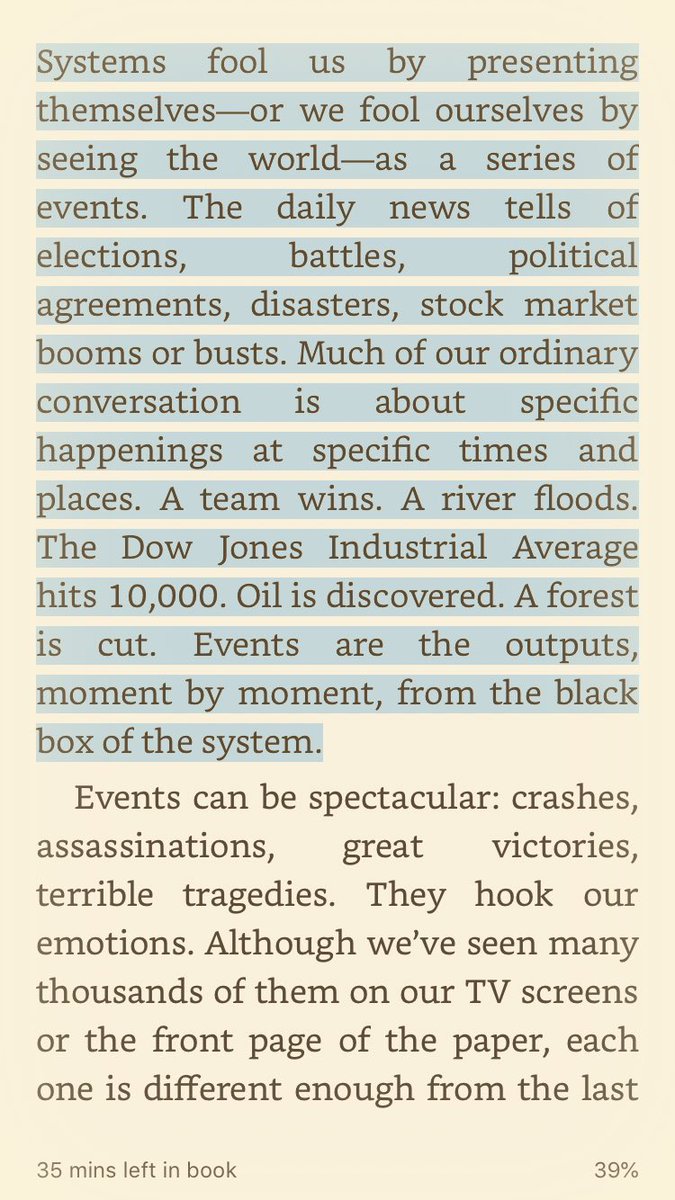
17/ An argument for not reading the news:
1. facebook.com/rahul.s.ramcha…
2. facebook.com/rahul.s.ramcha…
3. stevenbagley.net/blog/taleb-sig…
1. facebook.com/rahul.s.ramcha…
2. facebook.com/rahul.s.ramcha…
3. stevenbagley.net/blog/taleb-sig…
18/ It’s endlessly engrossing to take in the world as a series of events, constantly surprising, because that way of seeing the world has almost no predictive or explanatory value. Like the tip of an iceberg rising, events are the most visible aspect but not the most important.
19/ When a systems thinker encounters a problem, the first thing she does is look for data, the history of the system because long term behavior provides clues to the underlying system structure. And structure is the key to understanding not just what is happening, but why. 
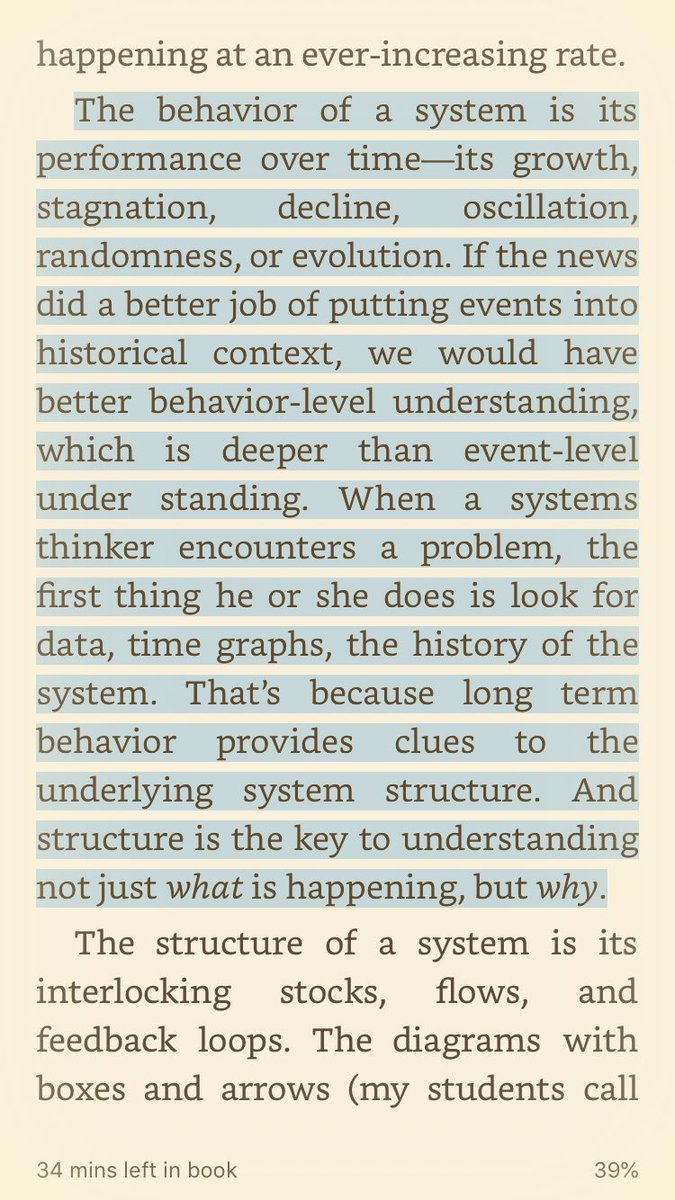
20/ And that’s one reason why systems of all kinds surprise us. We are too fascinated by the events they generate. We pay too little attention to their history andwe are insufficiently skilled at seeing in their history clues to the structures from which behavior and events flow.
21/ The lesson of boundaries is hard even for systems thinkers to get. There is no single, legitimate boundary to draw around a system. We have to invent boundaries for clarity and sanity; and boundaries can produce problems when we forget that we’ve artificially created them. 

22/ When there are long delays in feedback loops, some sort of foresight is essential. To act only when a problem becomes obvious is to miss an important opportunity to solve the problem.
24/ On interventionistas by @nntaleb:
Their three flaws: 1) They think in statics not dynamics, 2) they think in low, not high dimensions, 3) they think in actions, never interactions.
medium.com/incerto/on-neo…
Their three flaws: 1) They think in statics not dynamics, 2) they think in low, not high dimensions, 3) they think in actions, never interactions.
medium.com/incerto/on-neo…
• • •
Missing some Tweet in this thread? You can try to
force a refresh













